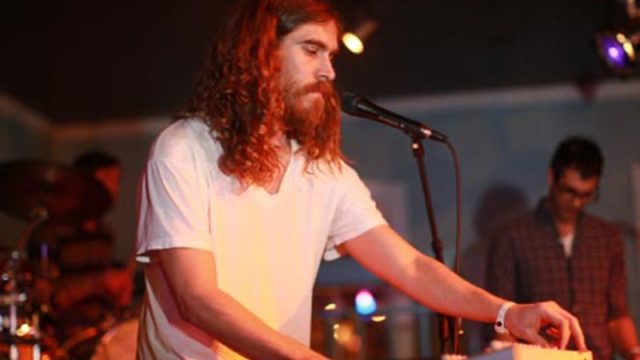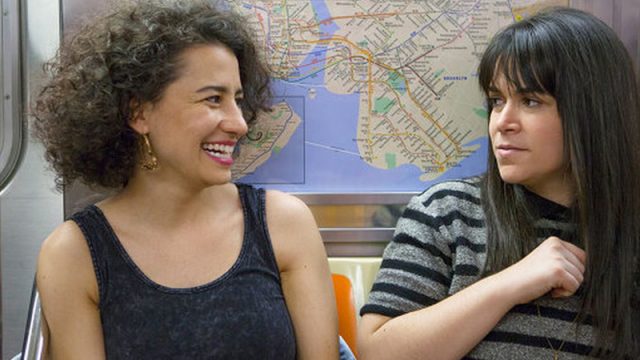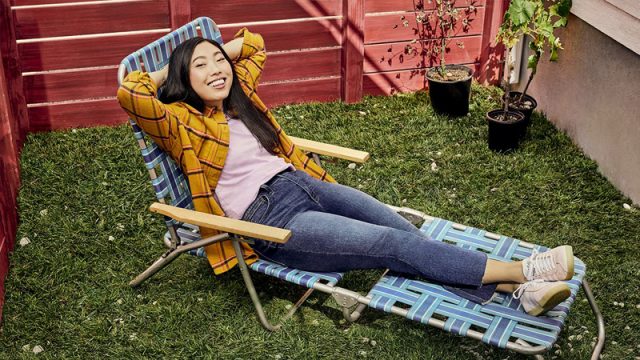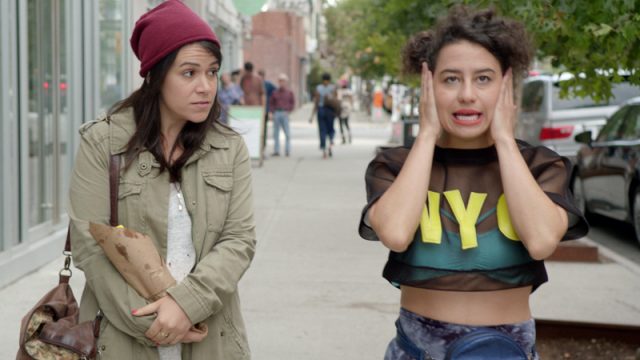ComingSoon writer Jeff Ames got the opportunity to interview Emmy Award-winning film and TV editor, Jon Philpot about his work on the television series Broad City and the upcoming film False Positive.
A24’s False Positive, starring Sophia Bush and Pierce Brosnan, from director John Lee, marks Jon’s leap from television to feature film and will be premiering at this year’s Tribeca Film Festival. Some of his other credits include Search Party, Wonder Showzen, and Anthony Bourdain: Parts Unknown. Currently, Jon is working on Akwafina is Nora From Queens. His talent was recognized in 2015 when Jon won a Daytime Emmy for single-camera editing on the PBS show The Mind of a Chef.
Jeff Ames: Hey Jon, thanks for meeting with us to talk about your work on Broad City. How is it over in Brooklyn?
It’s actually pretty good, man. You know, during the pandemic it was kind of dark and scary but it’s kind of turned and now it’s got a great vibe going on. Life is pouring back into it, and it’s awesome. On the other hand, it is a little bit different. Like, on the weekends, it’s like people are out and about, but the business district is still quiet.
Did the pandemic have any impact on your job as an editor?
Yeah. I was actually working on Search Party Season 4, and then we went dark. We didn’t know how to operate, you know, it’s like, what do we do? I think it was kind of good in a way to take a second, take a breath and be like, “Okay, let’s step back and figure out what’s meaningful in our lives.” And then eventually we came back, which was great, and then we made hard air dates and the show aired and everyone loved it. It was great.
Now you’re like, “Can we just work from home from now on?”
I know! Working from home has pluses and minuses —the commute part is weird because I kind of miss it, and then I don’t miss it. Here in the city, you can ride the train and read a book. I’ve read half a book this year. Normally, I plow through books. It’s getting a little dense up there.
That’s understandable. So, switching to your role as an editor, what initially drew you to the world of editing?
It’s funny, it started early when I was a little kid … I would just sit in my room and make tapes like I was a DJ — record a song off the air and then put a little thing in the middle and it was like my little radio show. Time goes by and I eventually went on to school at the University of Georgia, and I got an internship at a laboratory where they had an editing thing. I was helping the students put together their experiments — they were doing some kind of social experiment in the lab — and I was just like, this thing is the coolest thing I’ve ever touched in my life. You can do anything with this! And I just kept following it. From there I got an internship at a record label, which oddly led me to an internship at a post facility. And then I worked my way up to staff editor at the facility.
I learned a lot on that internship, like how to tell stories with design and not just — because we were limited in what we had as far as footage — so, it was a lot of like taking the smallest thing you could imagine and then building up something out of nothing. And then I moved to New York and then started freelancing. That was basically the culmination of years and years of trying and I stuck with it. I’ve been editing now for ages. I love it.

How do you develop your own style?
I think each editor has a style, whether you want it to be your style or not, it is your style, and I think you tend to develop things and you can re-develop your style within the framework of whatever show you’re working on. Hopefully, those two things go in tandem. Earlier on in my editorial career, I was more about quick cuts and I came in when reality TV was a big thing. We had to work with a lot of footage that wasn’t so great and had to figure out ways to make it entertaining. It was about building things up and using quick cuts to see how crazy you can make the show, and then fast forward down the line and — I’m also a musician — so, I was in a touring band and I actually took six years off of editing to go on tour. That was a massive detour! And during that time, it was informative in a lot of ways. I guess I didn’t even know it at the time that I was kind of jumping into this world where I was going on stage and I was performing every night and it’s almost like seeing the world on the other side of what an actor sees.
Before I was in the band and doing the touring thing, I was also doing documentaries, and then if I got a scripted show, I’d jump on it and get what I could out of it. I didn’t really come up so much through the assistant work chain … I was an assistant, but I kind of found my way through getting on shows and learning as I went along. Not everyone goes that path and I don’t know if that’s necessarily the best path to go. But when I got back off the road and I came back to the edit room, it was informative in a lot of ways because I was like, I think that I wanna move my career more towards the scripted stuff. I do really enjoy working on that. And performing on stage night after night really helped me see what it is like to be a performer. When these people are on set its super analog — everything is real. It is a real moment. And everything that happens on set is more real than anything, even though you’re making something that’s fictional, it is incredibly real. I took that to heart. I think that informed the way that I go about editing performances and stuff.
Now my editorial style is less about quick cuts and how much I can be in the front. I want to be in the back and I wanna push the performance up as much as I can. There is a certain push that you have to do, and in certain ways it feels like —and this may sound weird — but it feels uncool in a way, but you can service the performance. It’s all about staying in the background and trying to make the best version of what you see on the screen.
How does that style transfer to a show like Broad City where there’s a lot of improvisation mixed with scripted comedy?
Well, the thing with Broad City is that I’m super lucky to have gotten on that show. It came in at a crucial part in my development with editing and coming out of the more documentary world and into the more scripted world, it was kind of perfect in a way that it does help me with stuff like improv. You take it and you can make something even better. It doesn’t always work, the chemistry is not always there, but Abbi [Jacobson] and Ilana [Glazer] are a perfect match. The two of them really have a deep, loving relationship and it’s on-screen and then it’s real life. What happens on the page is almost like a roadmap. And then what happens on the set and the improv and all that is like the true gems; and you can make these little moments that really pop out and jump out of the screen.
Through working on that show, I got the trust of Ilana and was able to work on the movie False Positive with her. This is a huge leap for me to jump from scripted television to doing a feature film. She’s also jumping out of her comfort zone going into this and I was really happy that she let me come along for the rid.
It was really interesting to see her come out of the world of improv where she’s sort of free and then transitions to the more traditional scripted way. We have a message that we’re trying to get across and it’s very specific. So, it was interesting to see that transition with her; and then it also sort of recalibrated me, seeing her on-screen and how I react to her. I’m like, this is an all-new dimension. Broad City taught me a lot.
I remember when I interviewed for Broad City, I remember Ilana looking at my resume and she was like, “Look at all this MTV stuff — this old MTV!” And she’s like, that’s great! It turns out in their show they do a lot of montages and graphics. That experience came in handy.

What is the biggest difference between Broad City and False Positive in terms of how you tackle the material?
False Positive is quite different than Broad City. I worked on the show Search Party for HBO Max — we’re actually starting up again, which is very exciting. So, working with Sarah-Violet Bliss, Charles Rogers, Michael Showalter, Lilly Burns — it showed me a new light. That was on the heels of Broad City. I remember the first cut that I did and I was still cutting it pretty tight like how I cut those comedy shows. I remember Sarah-Violet being like, let’s slow this down. It was in that moment that I really took it and ran with it and it’s kind of become my favorite way to edit. The comedy is there, it lives on the screen, and you can service it for sure. You can help it, you can boost it, but the tempo and raising the anxiety and raising the tension through tempo is as important as anything.
Search Party reminded me of all the indie films and stuff that I loved when I was coming up in college — just stuff that moved a little bit slower and exists in an artful way.
But thankfully Search Party is funny. I was happy to have that experience. Without that experience, I don’t know if I would have approached False Positive in the right way because it kind of took what I learned from working on Search Party into this feature film where you have to work a little bit slower. The tempo is slower. You have a little bit more time to sit back, watch takes and absorb it a little bit and then build that tension through your tempo.
Was there a time where your editing changed the dynamics of a show?
Well, this isn’t a scripted show, but my time on Parts Unknown, the Anthony Bourdain show, was certainly a lot of that. I have been fortunate to work on that show for five seasons. I wouldn’t do a lot of episodes, but I’d come in and do like one episode, or at least one or two a season. And those shows were definitely built out kind of like beat sheets, roadmaps; and Tony, he had an interesting way of working in that he didn’t want you to put any sort of scratch voiceover. So, we would build these episodes and build it without any narration — and the narration is a big part of it, although as we went along, it became more about the moments; and it was a big challenge to build this world. In the end, it helped how that show felt because we would build it without the narration, and he would write the narration after he was inspired by what you cut. And it would, in some ways, radically transform what you see in front of you. Sometimes that was also a little bit nerve-wracking because we only had a certain amount of days to rework the whole thing. But somehow it always magically came together. I mean, he definitely had a vision. But those shows would start off one way from the beat sheet and then even go to editorial, and then there was another problem – a sort of paradigm shift.
I’m really proud of those episodes. I’m really happy that I got a chance to work on that show. It was really great. I learned some new, fantastic things about food or a place in the world. It was great.

Do you have any upcoming projects you can talk about?
Well, the thing that keeps happening, and I don’t know if it’s a byproduct of what I’ve worked on, but scripts that I get have a little bit more fantasy in them. I don’t know if it’s on purpose or if I’m just moving that way, I’m kind of just going with the flow. I think that the world of fantasy, sci-fi, and all that — I don’t so much sci-fi stuff, but I certainly am like angling in that direction. I’m wrapping up Aquafina is Nora from Queens, which is a super great show. That show is not necessarily fantasy, but it’s whatever it wants to be.
I worked on Girls5eva, which was breakneck jokes! Working with Meredith Scardino and Tina Fey and Robert Carlock — they’re on another level. So, if there’s some world where I could cross over into these, like there was fantasy and sci-fi but also this type of comedy, my God, that would be the dream.










